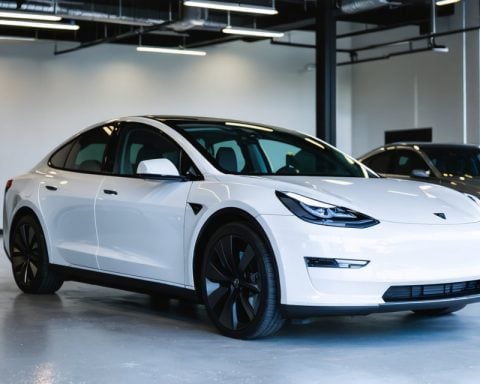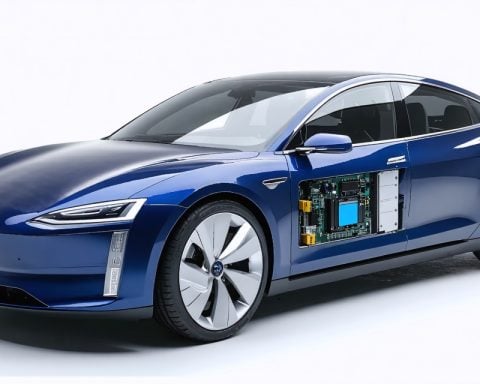- Eve Energy, a prominent battery manufacturer, opens its first overseas factory in Kulim District, Kedah, Malaysia.
- The new plant will produce 680 million cylindrical batteries annually, supporting power tools and electric two-wheelers worldwide.
- Expansion signifies Eve Energy’s $422.3 million investment in Malaysia, marking the beginning of its global growth strategy.
- Plans are underway for a significant electric vehicle battery plant in Debrecen, Hungary, augmenting Eve Energy’s global influence.
- This expansion highlights Eve Energy’s status as China’s sixth-largest battery producer and its critical role in the global supply chain.
- Eve Energy’s initiatives align with the global shift toward sustainable solutions, epitomizing innovation and ambitious industrial pursuits.
Beneath the tropical canopy of Malaysia, a new titan among battery manufacturers, Eve Energy, embarks on a bold international journey. This foreboding venture in Kulim District, Kedah signals not just the company’s first overseas factory but the dawn of a new era in its global ambition. An industrial colossus, the expansive plant stands poised with the might to churn out a staggering 680 million cylindrical batteries every year.
The whirring machines, echoing the symphony of progress, usher in a new chapter for Eve Energy—with batteries destined to juice up power tools and electric two-wheelers across the globe. From Southeast Asia to the far reaches of Europe and North America, these energy capsules will fuel the world’s appetite for mobility, one cell at a time.
The Malaysian plant, a strategic springboard, exemplifies the company’s keen eye on international horizons. Eve Energy’s ambitious $422.3 million investment, laid on Malaysian soil, is just the opening act. Plans for further expansion unfurl with similar magnitude in Europe, as Hungary prepares for an enormous electric vehicle battery plant that promises to reshape the landscape of EV manufacturing in Debrecen.
This bold expansion not only echoes Eve Energy’s dominance as China’s sixth largest battery producer but also underlines its pivotal role in the global supply chain, even catching the eye of EV giant Tesla. In this calculated dance of industrial strategy, Eve Energy is not merely constructing factories—it’s engineering a future charged with potential.
In a world racing towards sustainable solutions, Eve Energy’s leaps onto the international stage stand as a testament to relentless innovation and a blueprint for bold, cross-border industrial endeavors.
Why Eve Energy’s Expansion is a Game-Changer for the Global Battery Industry
Industry Trends & Market Forecasts
Eve Energy’s entry into Malaysia, with a massive $422.3 million investment for a new factory, is a testament to the global growth and evolution of the battery manufacturing industry. The demand for cylindrical batteries is escalating, driven by the burgeoning markets for electric vehicles (EVs) and various portable electronics. Market analyses predict that the global battery market could exceed $100 billion by the end of the decade, with cylindrical batteries occupying a significant share due to their widespread application in electric vehicles and power tools.
Key to this expansion is Eve Energy’s strategic position in Malaysia, which acts as a gateway to other Southeast Asian markets. According to the International Energy Agency (IEA), battery demand in the EV sector alone could grow by over 15% per year as nations propel toward greener economies. Eve Energy’s Malaysian plant can potentially satisfy a sizable portion of this demand, especially with its annual production capacity of 680 million batteries.
Real-World Use Cases
Eve Energy’s products primarily power electric two-wheelers and various power tools. In regions like Southeast Asia, where two-wheelers dominate the landscape, the need for efficient and durable batteries is critical. Additionally, as gardening and home improvement sectors are on the rise globally, power tools are in high demand, further driving the need for high-quality battery cells.
The company’s expansion into European markets, particularly for electric vehicle battery production in Hungary, aligns with the European Union’s ambitious targets for emission reductions and green energy adoption. Eve Energy’s expertise and capacity can support the manufacturing needs of major automotive players like Tesla, emphasizing their role in the shift toward electric mobility.
Controversies & Limitations
While Eve Energy’s growth is remarkable, the company faces challenges typical in global manufacturing expansion. Environmental concerns around battery production and end-of-life recycling pose significant hurdles. Critics often highlight the environmental impact of mining raw materials like lithium and cobalt, pivotal in battery production, and the energy-intensive manufacturing processes involved.
There are also geopolitical concerns, as international relations can affect cross-border operations and supply chains, especially in regions like Southeast Asia and Europe, where regulatory landscapes can vary extensively.
Features, Specs & Pricing
Eve Energy is known for producing high-performance cylindrical lithium-ion batteries that balance capacity, longevity, and safety. While specific specifications for the Malaysian-produced batteries are yet to be disclosed, their existing product lines cater to a range of energy-intensive applications.
Pricing strategies will likely be competitive to capture market share, though input costs, especially involving raw materials, will play a pivotal role.
Security & Sustainability
Sustainability is central to Eve Energy’s operation. The company emphasizes eco-friendly production methods and is expected to adopt renewable energy sources for its Malaysian plant. Secure supply chains and innovations in recycling and material recovery are areas they are likely to focus on, enhancing both the environmental and economic sustainability of their products.
Pros & Cons Overview
Pros:
– Strategic location: Access to Southeast Asian markets.
– Large production capacity: 680 million cells per year.
– Technological prowess: Advanced battery technology enhancing performance and safety.
– Alignment with global trends: Supports the EV revolution and green energy transition.
Cons:
– Environmental impact: Significant carbon footprint from manufacturing.
– Resource dependency: Reliance on geopolitically sensitive supply chains.
– Expansion risks: Complexities of operating across diverse regulatory environments.
Recommendations & Tips
For stakeholders in the battery and electric vehicle industries, partnering with Eve Energy can be advantageous due to their capacity and strategic market position. Monitoring the company’s technological advancements could offer insights into future battery innovations. Furthermore, companies should consider sustainable practices to mitigate environmental impacts associated with battery manufacturing and disposal.
For consumers, understanding the source and sustainability of battery products can be crucial. Opt for products with clear sustainability practices and seek manufacturers who prioritize eco-friendly methods.
For a deeper understanding of how energy innovations shape industries, readers may explore the latest trends and technologies in energy solutions at energy.gov.













